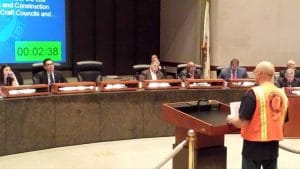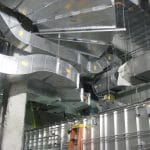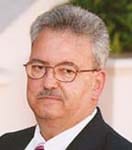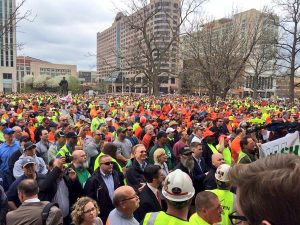
Labor is not alone in its opposition to this proposed law. More than 30 Indiana mayors have come out against the law, including the mayors of Evansville, Boonville, Mt. Vernon, and Rockford. In Bloomington, where a mayoral election is underway, Democratic challenger Darryl Neher has voiced strong support for the CCW, calling repeal “a short-sighted and foolhardy attack on the working men and women of Indiana.” Neher has proposed that the city council take action and draft legislation that allows Bloomington to maintain its ability to pay fair wages on publicly funded construction projects.
South Bend Mayor Pete Buttigieg called on his city council to make a similar move earlier this year. As he noted at the time:
“We can hold ourselves to a higher standard, and as the Economic Policy Institute suggests, in the process we can ensure worker safety, maintain the highest standards of construction quality, keep construction costs competitive and pay fair and livable wages.”
The bill, first passed in the Indiana House, is labelled HB 1019. It passed the Senate Tax and Fiscal Policy Committee by an 8-5 margin last week, meaning the Governor and conservative Republicans are one step closer to repealing that state’s Common Construction Wage which has worked for over 70 years. All committee Republicans voted in favor of the bill except for one, Senator Ed Charbonneau, who joined Democrats in voting against the wage-limiting bill.
Indiana’s Common Construction Wage is similar to the prevailing wage which sets wages and standards on publicly financed projects. Unlike the prevailing wage, the Common Construction Wage is determined by local boards composed of employers, Union representatives and two members of the local community.
Author: paul
On April 8, the Long Beach (CA) city council unanimously approved a historic 5 year Project Labor Agreement. For the next five years, projects being built under city of Long Beach contracts that are worth more than $500,000 must be built under the PLA, along with requirements that the contractors prioritize their hiring towards local workers.
The agreement was negotiated with the Los Angeles/Orange Counties Building and Construction Trades Council, representing SMART and other union crafts. Two departments with large construction projects — the Harbor Department and the Water Department — are not subject to the agreement because they are governed separately under the City Charter.
The city will use an outside PLA Administrator to work with contractors, and there will be a joint administrative committee with members from the city and the trades council to oversee the agreement. The minimum number of workers residing in Long Beach is set at 40 percent with those residing in Long Beach ZIP codes as a first tier, then those living in nearby cities and finally those in Los Angeles and Orange counties. A special focus is placed on dispatching disadvantaged and veteran workers.
Among those who spoke in favor of the agreement was Local 105 member Steve Gerdes who spoke on behalf of the PLA as a 22 year resident and homeowner in Long Beach. The Long Beach PLA came about with the assistance of former Long Beach City Councilman Patrick O’Donnell who recently became a CA State Assembly Member. Assemblyman O’Donnell is the son-in-law of retired SMART Local 105 Business Representative Brad Rooker.
The agreement’s $500,000 threshold is lower by half than those previously negotiated in Berkeley and Contra Costa, CA.
Sheet Metal Local 105 Business Manager Luther Medina noted that this agreement is “a step in the right direction that will further prove the value our skills bring to local taxpayers and the opportunities we can provide local residents with a solid career in our trade.”

Four new nuclear reactors are currently being constructed at two existing power plants: Plant Vogtle in Georgia (Sheet Metal Local 85) and VC Summer in South Carolina (Sheet Metal Local 399). Certified welders are needed for both of these projects. These jobs will have long term employment potential.
The qualifications for this work are very specific. The gate tests for the Plant Vogtle project are: ½” 7018 horizontal, vertical, and overhead; 1″ vertical and overhead; after hire in, same tests as 7018 but with flux core. In addition, 22 gauge to ½” MIG weld with bevel and tee joints will be tested.
Similar tests will be administered at the VC Summer site. Testing at the sites is performed with a hardhat welding hood. It is suggested that prior to contacting the job site locals or SMART International staff, welders should contact their home-area training center to arrange a review of their welding skills and an evaluation from the area certified welding instructor.
In addition to welding certifications, the jobs require a five-year employment history, drug test, and OSHA 10. A seven-year federal background check will also be performed.
If you already have these skills— or know of someone who does— get more information from SMART International Organizer Andrew Maute at (843) 513-9215, or by email at: amaute@smart-union.org. And contact your training center to find out how to add skills and become a in-demand certified welder.

“This train is essential to Colorado’s transportation system,” Smith said. “You might also remind Gov. Hickenlooper that he committed to finding funding for the train at the bill signing last year.”
Hickenlooper’s office phone number is (303) 866-2471.
For funding to pass, the bill needs the support of the following members from the state’s Joint Budget Committee:
- Kevin Grantham, (303) 866-4877, Kevin.Gratham.senate@state.co.us
- Pat Steadman, (303) 866-4861, Pat.Steadman.senate@state.co.us
- Millie Hamner, (303) 866-2952, Millie.Hamner.house@state.co.us
- Dave Young, (303) 866 2929, Dave.Young.house@state.co.us
By letter dated March 20, SMART General President Joseph Nigro has requested that the National Mediation Board (NMB) proffer arbitration to SMART Mechanical Workers on New Jersey Transit.
The request was done in concert with other unions in the New Jersey Transit Rail Labor Coalition. The Coalition represents 88% of the overall union membership on New Jersey Transit and was formed over the past several months. A decision by the NMB is expected in about a month.
If the National Mediation Board proffers arbitration, which SMART and the other coalition unions will reject, a Presidential Emergency Board will then be appointed. “This coalition has one goal, a fair contract for our Transportation and Mechanical Brothers and Sisters at New Jersey Transit”, said SMART’s Railroad, Mechanical and Engineering General Chairman John McCloskey. He added that “negotiations were at a complete standstill, this request for release is a necessary one.”
If the National Mediation Board agrees to release the coalition unions, it will proffer binding arbitration to the unions and NJT. When either side notifies the NMB that they reject binding arbitration, that starts a process that could take as long as 270 days if no voluntary agreement is reached, including two Presidential Emergency Boards (PEBs). The first PEB would be appointed within 30 days of either side’s rejection of the proffer of arbitration. At the end of the 270 days, both sides can resort to self-help. The Coalition elected to seek release after it became clear that NJT would not make a reasonable offer. The Coalition has proposed a settlement patterned after the contracts achieved at the Long Island Rail Road and Metro-North in New York. New Jersey Transit insists on concessionary contracts, with employees with families paying more than four times what they pay now for health benefits.
Click here for a copy of the NJ Transit Unions’ Joint Statement

The NLRB rule, set to take effect on April 14, would shorten the amount of time between when an election is called and when it is held by eliminating a 25-day waiting period. Usually, during this 25-day window, workers are barraged with a series of captive audience meetings and one on one meetings in front of management where they are interrogated about their allegiances prior to the election.
Republicans and anti-union groups oppose the rule, arguing that it would limit the ability of businesses to prepare for representation elections. Opponents also said workers wouldn’t have enough time to make “informed” decisions about whether to join a union.
Obama called the labor board’s changes “common sense” and “modest” before he vetoed the measure.
“Unions historically have been at the forefront of establishing things like the 40-hour work week, the weekend, elimination of child labor laws, establishing fair benefits and decent wages,” the President said. “One of the freedoms of folks here in the United States is, is that if they choose to join a union, they should be able to do so. And we shouldn’t be making it impossible for that to happen.”
The new NLRB rules also update election preparation to the new digital age by finally allowing documents to be filed electronically instead of solely by mail. The rule will also require employers to supply union organizers with workers’ contact information in order to allow more adequate time for the union to campaign on its side of the issues.
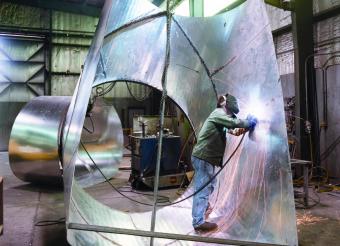
“We are looking at a deficit, as the average age of welders is around 55,” said Steve Kowats, who runs the International Training Institute’s South East Concentrated Welding Program. “We expect the demand for new certified welders to grow because of attrition and because of expanded work opportunities in the energy sector.”
Kowats has been working with JATCs around the country to help train members and trainers to fill the demand. “The demand is there, and we have the infrastructure in place. Now, we need our members to realize that if they get these certifications the opportunities are endless.”
“Our craft is not traditionally thought of as a welding craft,” says Kowats. “We need to change that perception. If we don’t, we’re giving up the chance to do the work. And ultimately, the work could go to a non-union contractor if we don’t step up.”
As the energy boom takes hold, welders are needed at sites like Plant Vogtle, located near Waynesboro in eastern Georgia near the South Carolina border. The plant is one of Georgia Power’s two nuclear facilities. Kowats and Sheet Metal Local 85 are placing members trained through the Concentrated Welding Program at Vogtle. The program is designed to run six days a week, ten hours a day, over a three-week period, but can be modified to fit a local’s schedule. The participants learn how to properly weld pipe, sheet, and plate and are, when done, prepared to pass multiple welding certifications.
“But they don’t just have to pass the welding tests. Applicants at these energy plants need to be prepared to pass stringent background checks and general education tests,” Kowats warns. “It isn’t just about having the welding skills necessary to do the job. A lot of these positions require federal security clearance.”
New construction starts in the month of February grew by 16 percent over the previous month due to some large scale projects that took off in Texas, Louisiana and California. According to Dodge Data and Analytics, total construction starts on an unadjusted basis were up 34% from the same two month period that started 2014. The $724 billion in new work is expected to serve as a boost to a construction industry that have limped through the years following the 2008 recession.
The three projects include an $8.4 billion liquefied natural gas (LNG) export terminal in Louisiana and a $1.2 billion solar power facility in California. A $3 billion petrochemical plant in Texas rounds out the list of major projects that came online in February and make be serving as an omen to what is expected to be a year that will see a surge in new construction.

H.R. 749, the Passenger Rail Reform and Investment Act of 2015 (PRRIA) will ensure that our national passenger rail system continues its mission to connect communities – both large and small – across the country. The legislation passed 316-101.
The bipartisan legislation was sponsored by the top leadership of the House Committee on Transportation and Infrastructure, including Chairman Bill Shuster (R-Pa.), Ranking Member Peter DeFazio (D-Ore.), Chairman of the Rail Subcommittee Jeff Denham (R-Calif.) and Subcommittee Ranking Member Michael Capuano (D-Mass.).
“In every region of the country, including the Pacific Northwest, passenger rail investments boost local economies and create thousands of family-wage construction, engineering, and manufacturing jobs. This bill isn’t perfect—but it was a bipartisan effort that ultimately provides critical investments and system wide improvements to increase capacity and make our railways safer. I’m glad that we were able to pass this legislation in a bipartisan way,” said DeFazio.
The legislation includes important reforms that will increase the number of loans issued to States, local governments, railroads, and shippers to finance the development of railroad infrastructure. The legislation includes strong Buy America provisions that ensure these loans are used to buy American steel, iron, and manufactured goods, boosting American manufacturing and created needed manufacturing jobs.
Retired former United Transportation Union Insurance Association Field Supervisor Thomas R. Anziano Jr., 73, of Local 1373 at Philadelphia, died Mar. 26 after an extended battle with cancer.
Anziano began his railroad career with CSX Transportation and worked as a conductor and yard foreman. He was a member of the UTU since 1972 and held several offices in his local including chairperson, legislative representative and delegate before working as a field supervisor for the UTUIA, a position from which he retired in 2005. He was also a member of the UTU Alumni Association. He was a veteran of the United States Air Force.
“Tom was always known as a kind, generous man who was loved and admired by everyone who knew him. Tom always put his family, friends and especially the UTU membership ahead of himself,” UTUIA Field Supervisor Art Rayner (Local 1374 at New Castle, Pa.) said. “I will always be forever grateful and indebted to Tom for all he had done for me after I replaced him as a UTUIA field supervisor. I will truly miss him.”
Anziano is survived by his wife, Barbara, and numerous family members.
A viewing is scheduled for Monday, March 30, at 8 a.m. at Cavanagh Family Funeral Homes, Inc., at 301 Chester Pike, in Norwood, Pa., with funeral mass to follow at 11 a.m. at St. Gabriel Church, Norwood, Pa. In lieu of flowers, donations can be made to Taylor Hospice Residence at P.O. Box 147, Ridley Park, PA 19078.
